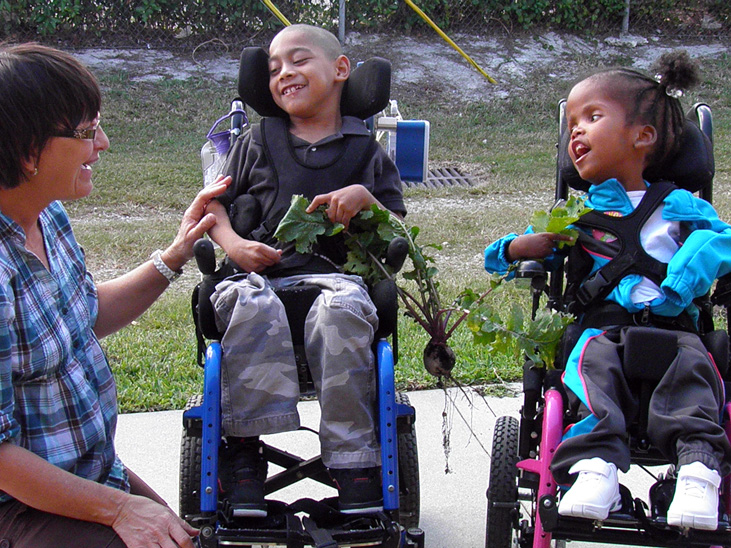 Wingate Oaks Center teacher Nancy McElligott talks with her students Christopher and Kiana about the turnip picked from their schoolyard garden. Photo credit: Elizabeth Rahe
Wingate Oaks Center teacher Nancy McElligott talks with her students Christopher and Kiana about the turnip picked from their schoolyard garden. Photo credit: Elizabeth Rahe
FT. LAUDERDALE, FL., -- The announcement that milkshakes are available in Room 808 "for as long as they last" punctuates a tour of Broward County School's Wingate Oaks Center in western Fort Lauderdale. Ruthanne Newell, the school's autism and curriculum specialist, is not in range to score a shake. She is busy showing off the school's occupational and agrarian endeavors – classroom edible gardens, a fledgling tropical orchard, business card printing, trophy and plaque engraving, a dollar store and a healthy snack shop – designed to give the K-12 students here, all with significant intellectual disabilities, real-life learning experiences.
"With everything we do, we think about what our students' next community will be, and we work to prepare them for that," Newell says. "The theory is that you develop skills in the area in which the student has an interest. If a student is an artist, you try to turn that into a business."
School-based enterprises tap into those interests. Students prepare business cards to sell to the public (for a donation), sell snacks to other students and staff or work at an occasional school car wash or hot dog stand. Wingate Oaks also takes in production jobs, such as assembling packets for mailing and repackaging products, and provides on- and off-campus job training in which students shadow an employee under the direction of a coach. (Partners include IHOP, Applebee's, Publix, Muscular Dystrophy Association and Pompano Beach Rehabilitation Center.)
Back in Room 808, the milkshakes are part of a food-science lesson for teacher Nancy McElligott's students with multiple disabilities, who range in age from 5 to 13. McElligott also runs the Dollar Dome, a mini dollar store that supports financial literacy for students throughout the school.
"Students learn the value of money in a real-life environment. They also use emerging communication skills and learn to make choices," says McElligott, who stocks the store with a variety of gift items. Mother's Day gifts, such as velvet roses and jewelry are hot sellers this time of year, she says.
Just outside her classroom is a 6-by-12-foot garden planted with turnips, collard greens, onions, beans, cabbage, herbs and marigolds. She pulls up a plump turnip and shows it to two of her students, Christopher and Kiana, who grin with delight as they dangle the vegetable between their wheelchairs. McElligott points out tiny a worm on the leaves. "We don't use pesticides. We learn about nature this way," she says.
Next door, Noel Doglione works with two boys from her class of elementary students with autism or intellectual disabilities. Lucas and Ethan run off excess energy in the garden, stop to sniff the basil and dig in the dirt as she talks to them about what they are experiencing. They have watched their crop grow from seeds, tending them along the way. Doglione says the garden has provided an outdoor living space and varied ways for students with disabilities, including those with limited vision or mobility, to take part in hands-on lessons in science, reading and math.
"It brings a better understanding of the world right to our own back yard," Doglione says, adding that the process also has produced a calming effect. "The entire class has benefited from the garden, students and adults alike."
Wingate Oaks Center staff and students have used the harvests from the 20 varieties of vegetables, berries and herbs to make soup, drawing from the Stone Soup folktale to teach a lesson on the power of working together, Newell says. When the cabbages came in all at once, the school held a Southern cabbage tasting, with student-selected recipes prepared by the staff and served with cornbread. "We had recipes with bacon and without, and the bacon won. According to the kids, pork fat rules," she says.
In addition to the gardens, the school has a tropical orchard, planted last summer with more than two dozen trees – guava, banana, plantain, avocado, lychee, cherry, papaya, star fruit, mango, soursop and sweet sop. The 2- to 4-foot trees are providing lessons in science, math and responsibility for students charged with their care, Newell says.
"Long after we're gone, the orchard will continue to grow, allowing future populations of students to share in the story," she adds.
{igallery id="583" cid="27" pid="1" type="classic" children="0" showmenu="1" tags="" limit="0"}





















